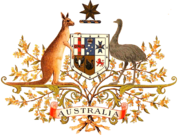- Combet v Commonwealth
-
Combet v Commonwealth 
Court High Court of Australia Full case name COMBET and others v COMMONWEALTH and others Date decided 2005 Citation(s) (2005) 221 ALR 621 Judge(s) sitting Gleeson CJ, McHugh, Gummow, Kirby, Hayne, Callinan and Heydon JJ Case history Prior action(s) none Subsequent action(s) none Case opinions (5:2) Advertising government policy using public funds is lawful under the appropriation act (per Gleeson CJ, Gummow, Hayne, Callinan and Heydon JJ ) Combet v Commonwealth was an Australian court case decided in the High Court of Australia in 2005. The case was the result of a challenge against the lawfulness of the Federal Government's use of public funds to advertise the new Workchoices laws.
Contents
Background to the case
In May 2005 the Prime Minister informed the Australian House of Representatives that the federal government intended to reform industrial relations laws by introducing a unified national system. In the following weeks, the Australian Council of Trade Unions (ACTU) began an opposition campaign to the proposed laws which included extensive television advertising. On 23 July 2005,, the first defendant, the Commonwealth of Australia, printed advertisements in newspapers and on 15 August 2005, the first defendant entered into contracts amounting to 3.84 million dollars for the purpose of advertising the proposed reforms. The funding for the advertisement was to be drawn out of the public funds of the treasury of the Commonwealth. In October 2005, the ACTU and the Australian Labor Party brought an action against the Federal Government, claiming that the public funds used to advertise the WorkChoices legislation were not appropriated by law.
Arguments
Under section 81 of the Australian constitution, all monies raised by the executive government of the commonwealth must “be appropriated for the purposes of the Commonwealth in the manner and subject to the charges and liabilities imposed”.[1] Furthermore, section 83 of the constitution forbids the drawing of money from the commonwealth except under “appropriation made by law”. The appropriation made by law is created through the annual passing of the Appropriation Act which appropriates “money out of the Consolidated Revenue Fund for the ordinary annual services of the Government, and for related purposes” .[2] The principle legal issue in this matter is whether the funding of advertisements, informing and proposing the proposed reforms to Australia’s Industrial Relations system was appropriated by Schedule 1 of the Appropriation Act (No. 1) 2005- 2006 (Cth).
The plaintiffs alleged that contrary to section 83 of the constitution, the funds used to finance the advertisements informing and promoting the proposed reforms, was not “appropriated by law” as they did not fall within the relevant outcomes as set out in schedule 1 of the Appropriations act. The defendants contended that the advertisements would at least fall within outcome 2, “higher productivity, higher pay workplaces” and also, appropriations should be interpreted broadly.
Judgment
Gummow, Hayne, Heydon and Callinan JJ
Gummow, Hayne, Heydon and Callinan JJ ruled in favour of the defendants on the basis that departmental items were not tied to their outcomes. In other words, government expenditure was lawful as long as the government had stated what the funds were being used for and that it was not the job of the courts to decide whether government policy would result in its stated goals.
Gleeson CJ
Chief Justice Gleeson ruled that the advertisement could possibly result in "higher productivity, higher wages" and that it was for parliament to decide how best to achieve its aims.
Kirby and McHugh JJ
Justices Kirby and McHugh dissented on the account of public funded advertisement not being appropriated at law when it has no nexus with the aims of the expenditure.
References
Categories:- High Court of Australia cases
Wikimedia Foundation. 2010.
